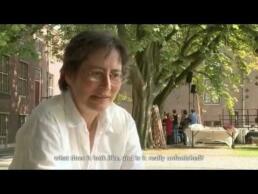Details
Duration:
24'
Instrumentation:
Solo Voice(s) soprano, mezzo-soprano, tenor, bass Chorus SATB 2perc/2cim.hmn.pianola
Commissioned by:
Peppie Wiersma with financial support from the Société Gavigniès
First performance:
15 August 2009 at the Hermitage in Amsterdam as the opening concert of the Grachtenfestival, performed by Cappella Amsterdam:
Françoise Rivalland: Cimbalom
Michiel Weidner: Cimbalom
Dirk Luijmes: Harmonium
Peppie Wiersma: Percussion
Rozemarie Heggen: Percussion
In Theo's Own Words
Finishing an “Unfinished” Svadebka
“In April of 2003, I received a phone call from percussionist Peppie Wiersma. She wanted to perform the 1919 (unfinished) version of Stravinsky’s Les Noces/ Svadebka, and asked if I would complete the instrumentation of the last two scenes. I studied the material, and my first reaction was one of caution, but Peppie persisted. First a practical problem had to be solved: there was no point in even beginning without permission from Stravinsky’s heirs, and getting that permission was going to be no easy task. Finally, after four years, in March 2007, the heirs reached an agreement with Chester Music, the publisher.
That was the moment for me to begin working. I received a facsimile edition of the two scenes completed by Stravinsky and studied them thoroughly. Seeing that the orchestration consists not only of two cimbaloms, a harmonium and percussion but also a pianola, I learned as much as I could about the ins and outs of the instrument from Kasper Janse at the Pianola Museum here in Amsterdam.
Although I’m already familiar with the cimbalom (I used it in a piece of mine in 1987), I seek further advice from Françoise Rivalland, an expert on the instrument. The level of difficulty in the already completed scenes seems to be very high. We experiment with the sound of different types of sticks, and check the diagram for which I’ll be writing the score. Next I visit harmonium specialist Dirk Luijmes, who explains to me the many possibilities and limitations of his instrument.
In the autumn of 2007 I fan out the four versions of Svadebka across my desk: the facsimile of what Stravinsky had completed of the 1919 version, the withheld version of the 1917 orchestration, the definitive 1923 version, and the piano score. Finally I can get to work. I make it my task in scenes 3 and 4 to be as faithful as possible to the character of Stravinsky’s instrumentation in the first two scenes. The important principles here are the central role of the pianola, the degree of difficulty in the writing for the individual instruments, the (sometimes daring) balance between voices and instruments, and finally the rediscovering of the correct manner of notation. (?) During my work I constantly compare the different versions with each other and draw my own conclusions from the discrepancies.
On November 16th, 2007, I send Peppie and Chester Music the completed score for the 1919 version on Svadebka for soloists, choir, two cimbaloms, harmonium, pianola and percussion.”
– Theo Verbey
In Concert
11 Jan 2015
Cantate Basel Kammerchor, Von Arb/Lawson/Brahms, Dvorak, Bartok, Stravinsky
Basel, Switzerland
10 Jan 2015
Cantate Basel Kammerchor, Von Arb/Lawson/Brahms,Dvorak,Bartok,Stravinsky
Basel, Switzerland
14 Sep 2013
RIAS Kammerchor, Ensemble muzikFabrik/Stravinsky, Kagel, Janacek/Marches, rhymes, weddings
Berlin, Germany
Press Quotes
“Of all his ballets, Stravinsky’s Les Noces – an evocation of Russian peasant wedding rituals – was the one he laboured over longest as he changed his mind several times about its instrumentation.[…]
All that said, the pianola’s mechanistic and inexorable tempo drives much of the performance, effectively depersonalising the ritual while sharpening the rhythmic profile of much of the music. Yet the Ensemble Aedes and its various soloists, even while working with the pianola’s relentless drive, admirably characterise their singing, one moment full of rough enthusiasm or raw emotion, the next beguilingly lyrical.
Hearing Stravinsky’s long-desired but originally unfulfilled version of Les Noces – so compellingly realised between Verbey and these fine musicians – is worth the price of entry alone.” – Daniel Jaffe, BBC Music Magazine
